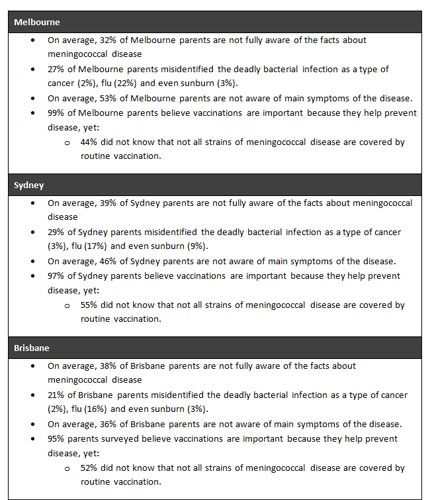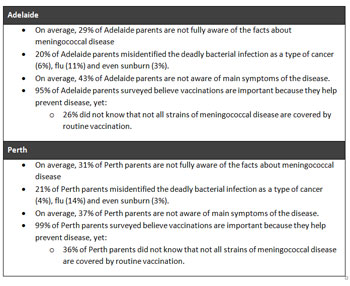Kyly Clarke #KnowMeningococcal Interview

Kyly Clarke #KnowMeningococcal Interview
Whilst 93 percent of Australian parents believe that they know what meningococcal disease is, on average nearly a third of Australian parents (28%) are not fully aware of the facts about the disease. Of parents recently surveyed, 22 percent misidentified the deadly bacterial infection as a type of cancer (2%), flu (16%) and even sunburn (4%).
In response to the research, commissioned by GlaxoSmithKline (GSK), a national awareness campaign #KnowMeningococcal is launching in partnership with Kyly Clarke – mum to Kelsey Lee and wife of Aussie Cricket legend Michael Clarke – to encourage parents to know more about the devastating and potentially life-threatening bacterial infection.
Whilst rare, meningococcal disease can progress rapidly - resulting in death within 24 hours or serious long-term disabilities, including brain damage, deafness and limb loss. Despite the risk, the survey of 1,000 parents with young children found that on average, 41 percent of Australian parents are not aware of some of the more specific symptoms of the disease.
Almost all (97%) parents surveyed believe vaccinations are important because they help prevent disease, yet many parents have not taken their child to receive any vaccinations outside of the routine childhood vaccination schedule. Almost half (46%) did not know that routine childhood vaccination did not cover all strains of meningococcal disease.
 Professor Robert Booy, Head of the Clinical Research Team at the National Centre for Immunisation Research and Surveillance (NCIRS) said, 'while awareness of meningococcal disease is high, the research has found there is still very little public understanding about the signs and symptoms, the serious risks the disease poses, and the different types of strains. There are six different types of the bacteria that cause meningococcal disease and four of these types are present in Australia. Most parents only know of one type and don't realise that the rest of the strains aren't covered by their routine vaccinations."
Professor Robert Booy, Head of the Clinical Research Team at the National Centre for Immunisation Research and Surveillance (NCIRS) said, 'while awareness of meningococcal disease is high, the research has found there is still very little public understanding about the signs and symptoms, the serious risks the disease poses, and the different types of strains. There are six different types of the bacteria that cause meningococcal disease and four of these types are present in Australia. Most parents only know of one type and don't realise that the rest of the strains aren't covered by their routine vaccinations."
Meningococcal disease is a rare bacterial infection of the blood and/or membranes that line the spinal cord and brain. Some of the symptoms that may be present include high fever, severe headache, nausea and vomiting, or a reddish or purple skin rash. Infants, young children and adolescents are most at risk, especially those under the age of four, and babies under 12 months have the highest risk, which is why it is something every parent needs to know more about.
Commenting on why she's supporting the KnowMeningococcal campaign, Kyly Clarke said 'when it comes to my daughter, Kelsey Lee, like all parents all I want is for her to be healthy and happy. While I knew about meningococcal disease, it wasn't until I met families affected by the disease that I realised how important it is as a parent to not only know the signs and symptoms to look out for, but also how to protect against it."
Meningococcal disease is rare and it can be devastating, but you can help to protect against it. Talk to your general practitioner and visit KnowMeningococcal.com.au to learn more about the signs and symptoms of meningococcal disease and how to prevent it.
Interview with Kyly Clarke - KnowMeningococcal's Campaign Ambassador, Lyfestyled Entrepreneur and mum to Kelsey Lee and wife of Aussie Cricket legend Michael Clarke
Question: What is meningococcal disease?
Kyly Clarke: Meningococcal disease is a bacterial infection of the blood and/or membranes that line the spinal cord and brain. Common symptoms may include sudden high fever, severe headache, nausea and vomiting, or a reddish or purple skin rash.
Infants, young children and adolescents are most at risk, especially those under the age of one, which is why it is something every parent needs to know more about. In Australia, there are three main strains of the disease, however currently routine childhood vaccinations protect against one strain, meaning children can still be exposed to other strains of the bacteria.
 Question: Why must we know more about meningococcal disease?
Question: Why must we know more about meningococcal disease? Kyly Clarke: Well, as parents we have an urgency to know everything and feel like we are letting ourselves down when we don't have all the answers. Don't worry, you don't need to know everything about meningococcal disease but I think every parent should be aware that while it's rare, the disease is potentially life-threatening for your child and GSK's recent research shows that most of us are still confused about the disease so it's worthwhile to be well versed on the below:
1. Know the signs and symptoms: If your child is experiencing a high fever, nausea and a sudden red or purple rash take them straight to the doctors. Parents know their children the best and should seek medical attention if their instincts tell them that something is wrong.
2. It's preventable: Parents should also know that it's preventable. For example, there are vaccines available against every strain of meningococcal that is common in Australia.
3. Your GP can help: there are three main strains of the disease in Australia, however currently routine childhood vaccinations protect against one type , meaning children can still be exposed to other strains. Speak to your GP to find out how to help protect against all common strains of the disease
4. Trust your gut instinct: No one knows your child better than you do. If you're concerned about your child's health, monitor for signs and symptoms, and always seek advice from a healthcare professional if your child's condition continues or gets worse.
5. Head to our website knowmeningococcal.com.au to find out more
Question: Can you share some of the insights you've heard from families affected by meningococcal disease?
Kyly Clarke: As the campaign ambassador for KnowMeningococcal I've had the opportunity to hear personal stories told by survivors of meningococcal disease or their families, or by families who have lost a loved one to the devastating disease. Each one is different and moving illustrating how important early diagnosis and treatment is for the disease. You too can view some of stories (s) by visiting knowmeningococcal.com.au
Q
 uestion: Why is it important for you to raise awareness for meningococcal disease?
uestion: Why is it important for you to raise awareness for meningococcal disease? Kyly Clarke: Now that I'm a mum myself, I understand the overwhelming need parents have to protect your child, and how top of mind your child's health is. Meningococcal disease, while rare, can be devastating. While I knew about meningococcal disease, it wasn't until I spoke to families affected by the disease that I released how important it is as a parent to not only know the signs and symptoms to look out for, but also how to protect against it. That's why I was inspired to get involved and hopefully help other parents with their child's health journey.
Question: Why must we know more about meningococcal disease?
Kyly Clarke: Well, as parents we have an urgency to know everything and feel like we are letting ourselves down when we don't have all the answers. Don't worry, you don't need to know everything about meningococcal disease but I think every parent should be aware that while it's rare, the disease is potentially life-threatening for your child and GSK's recent research shows that most of us are still confused about the disease.
Question: What's the most important message you'd like to spread regarding meningococcal disease?
Kyly Clarke: With the KnowMeningococcal campaign we want every parent to know about Meningococcal disease – what signs and symptoms to look out for and how to prevent it. Get the information you need to protect your child – speak to your GP and visit knowmeningococcal.com.au
Interview by Brooke Hunter
MORE



